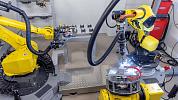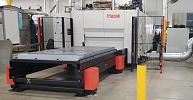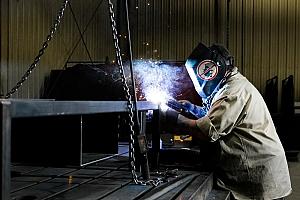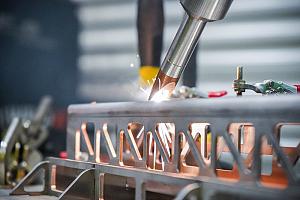Editor-in-Chief
- FMA
- The Fabricator
- FABTECH
- Canadian Metalworking
Categories
- Additive Manufacturing
- Aluminum Welding
- Arc Welding
- Assembly and Joining
- Automation and Robotics
- Bending and Forming
- Consumables
- Cutting and Weld Prep
- Electric Vehicles
- En Español
- Finishing
- Hydroforming
- Laser Cutting
- Laser Welding
- Machining
- Manufacturing Software
- Materials Handling
- Metals/Materials
- Oxyfuel Cutting
- Plasma Cutting
- Power Tools
- Punching and Other Holemaking
- Roll Forming
- Safety
- Sawing
- Shearing
- Shop Management
- Testing and Measuring
- Tube and Pipe Fabrication
- Tube and Pipe Production
- Waterjet Cutting
Industry Directory
Webcasts
Podcasts
FAB 40
Advertise
Subscribe
Account Login
Search
Do your continuous improvement activities include the front office?
Fab shops can take steps to enjoy more accurate and timely quoting
- By Dan Davis
- April 28, 2021

Metal fabricating companies will spend countless hours and money in trying to find new efficiencies on the shop floor, but are they applying the same critical eye to front-office operations? A webinar can provide details as to how these companies can whip their quoting efforts into shape. Getty Images
If you are a regular reader of The FABRICATOR, you are familiar with conversations about continuous improvement activities intended to make the shop floor more efficient and seamless. Topics include pull manufacturing, where parts are made only when the downstream manufacturing process requires them, keeping aisles clear of work-in-process; cross-training, which allows for employees to cover for each other at different machines and workcells, which keeps production flowing even in the face of unscheduled absences; and 5S, where reference materials, equipment, and tools are organized in such a way that they are easy to find and don’t require someone to go looking for them. Of course, those topics are a few examples. As any manufacturer will tell you, continuous improvement never ends, and the coverage of the subject likely won’t end in the pages of The FABRICATOR anytime soon.
The interesting point, however, is that most of the focus of these improvement initiatives is the shop floor. Are metal fabricators placing the same focus on front-office activities?
The stakes are just as high, if not higher, because winning new business is crucial to not only keeping the pipeline filled with work, but also ensuring that it’s profitable. Without accurate and profitable quotes, a shop can get into trouble really quickly.
The challenge for most shops when it comes to quoting is collecting the references that are used to create the quotes in one specific place. Data could be found in emails, spreadsheets, sticky notes, or old spiral notebooks. There’s no guarantee that the same RFQ will result in the same answer if it is prepared by two different estimators.
In these paper-based environments, efficiency is lost every time a piece of quoting intelligence is saved in another place. Experts call this the creation of a “silo of information.” Co-workers describe it as something they are unaware of until they are told about it and that they are likely to forget about just as quickly.
Quoting is too important to leave up to these kinds of variables. Software can help to reduce the potential for errors and create that one repository of institutional knowledge, instead of multiple experts that might not have the best communication or organizational skills.
Jason Ray, co-founder/CEO of Paperless Parts, the developer of a software platform designed to improve quoting accuracy and response time for metal manufacturers, is leading a webinar on Tuesday, May 18, at 2 p.m. ET, where he’ll show shops how to centralize quoting knowledge and connect the front office to the shop floor to drive efficiency and reduce risk. Fabricators interested in attending “Escape Your Share Drive: How Sheet Metal Fabricators Can Create a Digital Thread That Connects Their Front Office to the Shop Floor” can sign up here.
A fabricating company is stronger when everyone is taking steps to improve. The front office needs to be part of the journey as well.
subscribe now

The Fabricator is North America's leading magazine for the metal forming and fabricating industry. The magazine delivers the news, technical articles, and case histories that enable fabricators to do their jobs more efficiently. The Fabricator has served the industry since 1970.
start your free subscriptionAbout the Author

Dan Davis
2135 Point Blvd.
Elgin, IL 60123
815-227-8281
Dan Davis is editor-in-chief of The Fabricator, the industry's most widely circulated metal fabricating magazine, and its sister publications, The Tube & Pipe Journal and The Welder. He has been with the publications since April 2002.
Related Companies
- Stay connected from anywhere

Easily access valuable industry resources now with full access to the digital edition of The Fabricator.

Easily access valuable industry resources now with full access to the digital edition of The Welder.

Easily access valuable industry resources now with full access to the digital edition of The Tube and Pipe Journal.
- Podcasting
- Podcast:
- The Fabricator Podcast
- Published:
- 04/30/2024
- Running Time:
- 53:00
Seth Feldman of Iowa-based Wertzbaugher Services joins The Fabricator Podcast to offer his take as a Gen Zer...
- Trending Articles
JM Steel triples capacity for solar energy projects at Pennsylvania facility

Fabricating favorite childhood memories

How laser and TIG welding coexist in the modern job shop

Robotic welding sets up small-batch manufacturer for future growth

Ultra Tool and Manufacturing adds 2D laser system

- Industry Events
Pipe and Tube Conference
- May 21 - 22, 2024
- Omaha, NE
World-Class Roll Forming Workshop
- June 5 - 6, 2024
- Louisville, KY
Advanced Laser Application Workshop
- June 25 - 27, 2024
- Novi, MI
Precision Press Brake Certificate Course
- July 31 - August 1, 2024
- Elgin,



























